|
St Stephens (Hackington 1858)
Canterbury
01227 463974
http://www.yeoldebeverlie.com
https://whatpub.com/olde-beverlie
https://youtu.be/gLSY6t8Of7s?si=ZXRBV-h_3xgz5Kzu
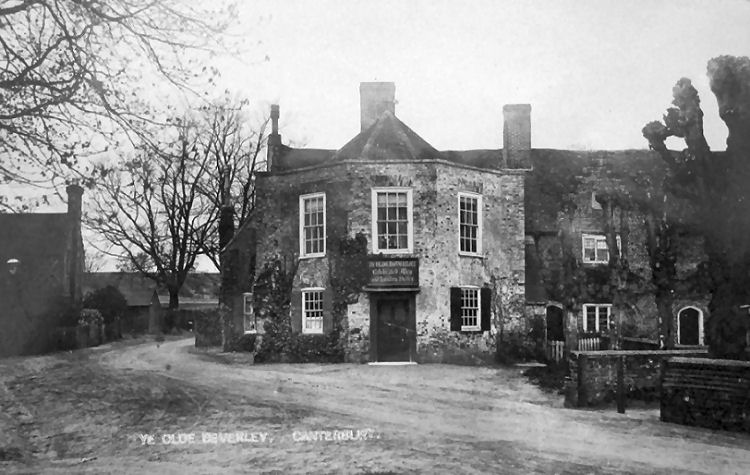
Above postcard, circa 1896, kindly sent by Rory Kehoe. |

Above photo 1896 showing a bat and trap team, kindly sent by Rory Kehoe. |
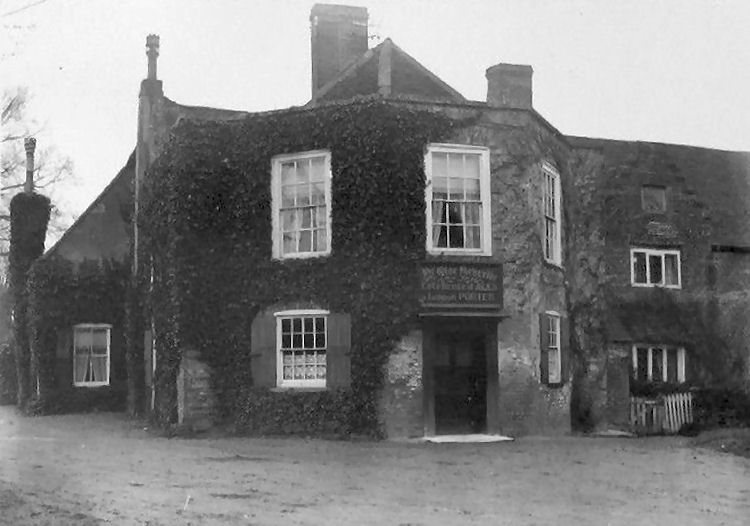
Above photo, circa 1900, kindly sent by Rory Kehoe. |
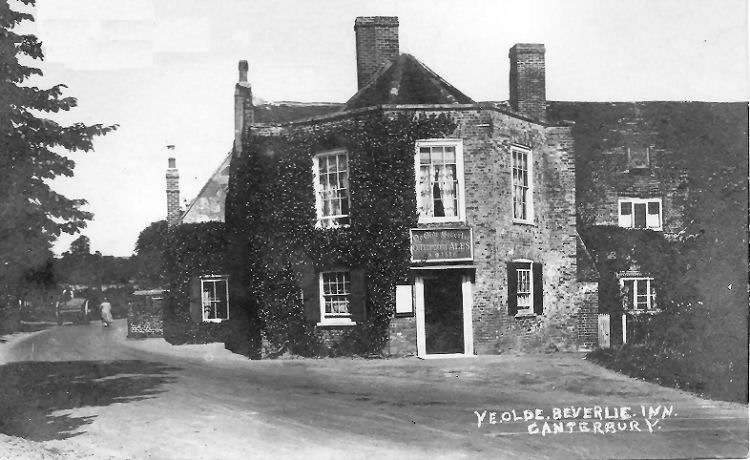
Above postcard, circa 1900, kindly sent by Rory Kehoe. |
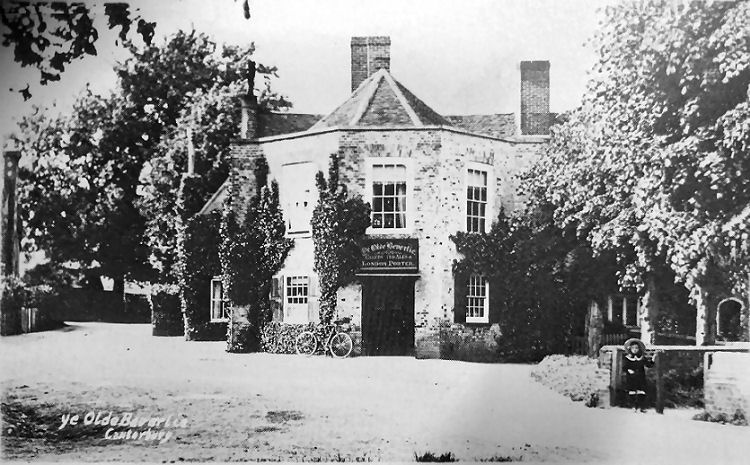
Above photo, 1907, kindly sent by Rory Kehoe. |
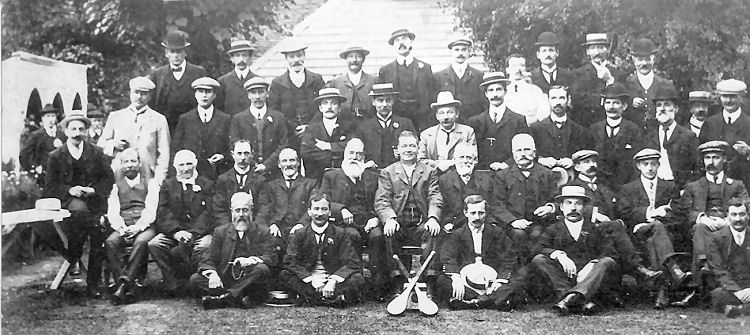
Above photo, 5th September 1907, marked the Beverlie Bat & Trap
Club's 100th Anniversary. Kindly sent by Rory Kehoe. |
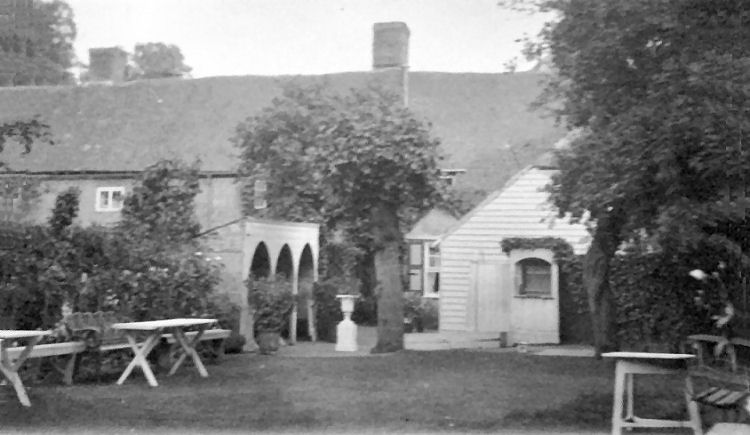 Above photo, circa 1924, kindly sent by Rory Kehoe. |
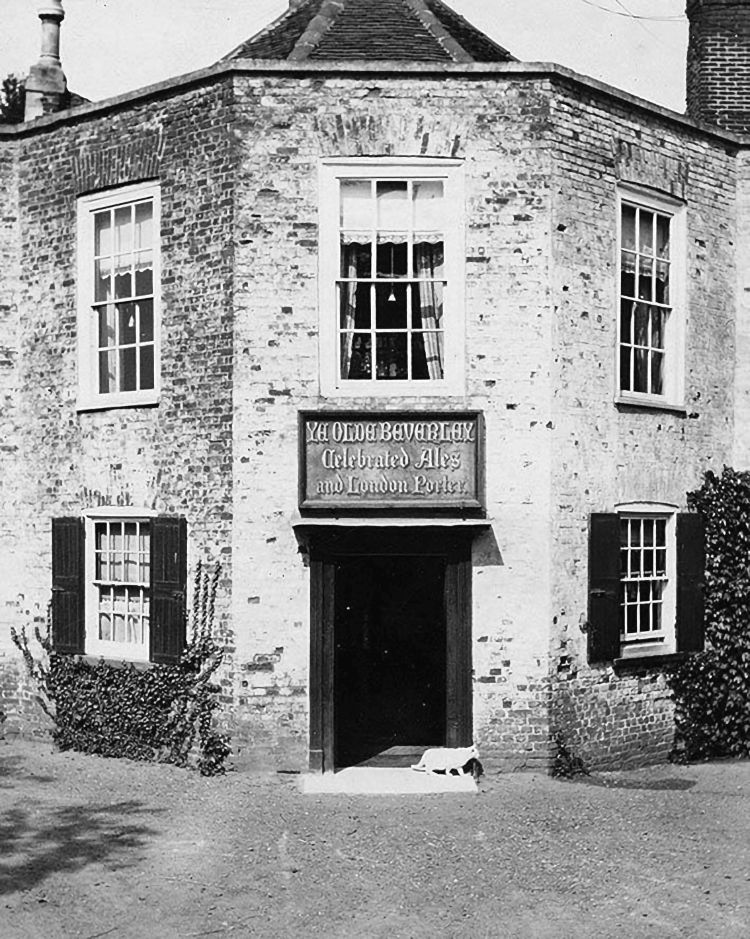
Above photo, circa 1925, kindly sent by Rory Kehoe. |
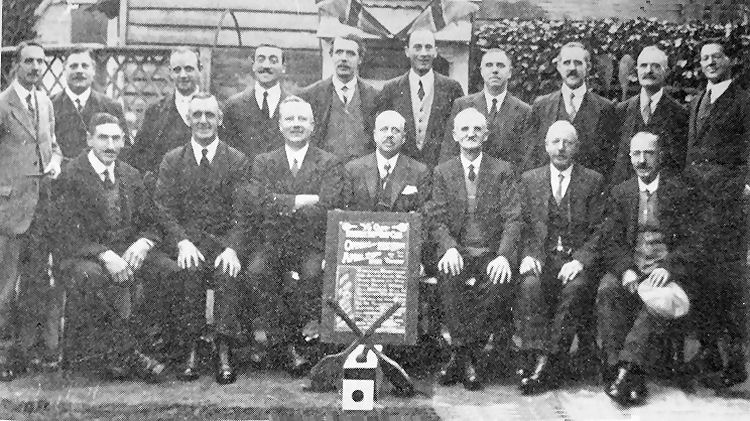
Above photo, 1926, Bat and Trap team, kindly sent by Rory Kehoe. |
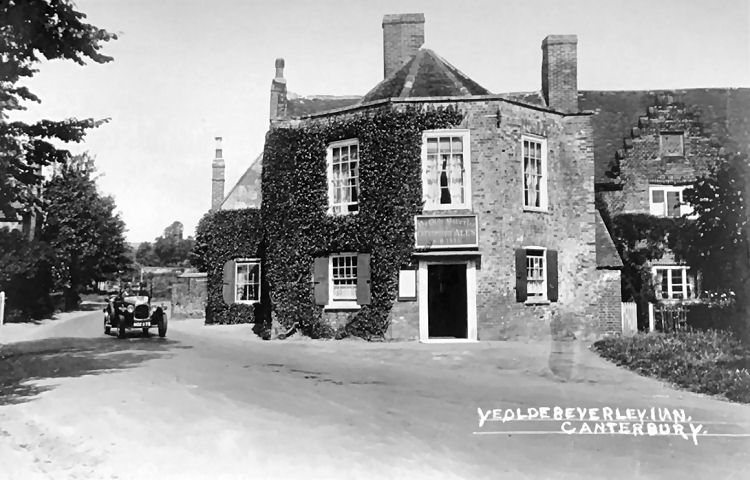 Above photo, circa 1926, kindly sent by Rory Kehoe. |
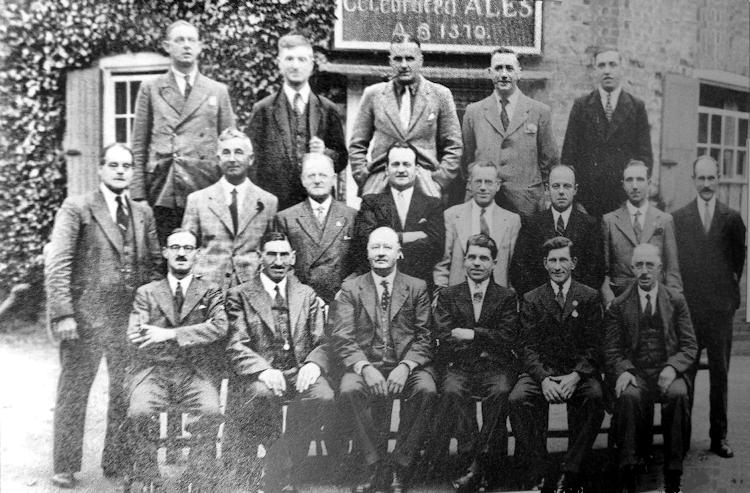
Above photo showing the Bat and Trap team 1932, kindly sent by Rory Kehoe. |
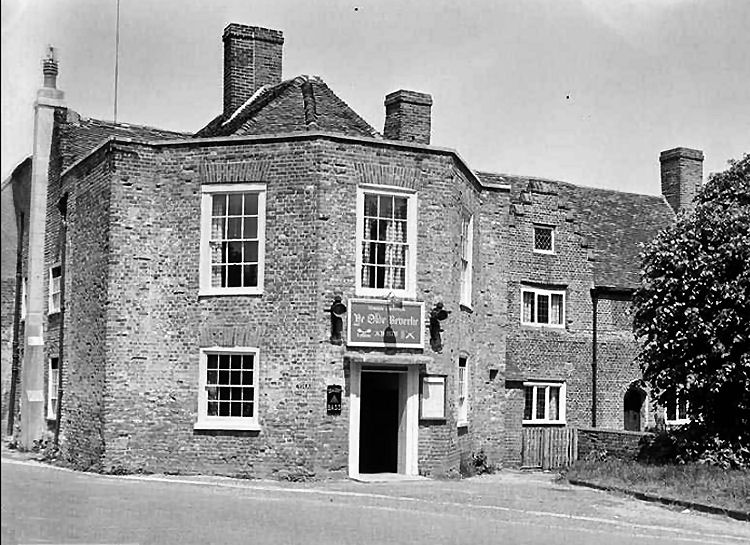
Above photo, circa 1944, kindly sent by Rory Kehoe. |

Above photo, 1944, kindly sent by Rory Kehoe. |
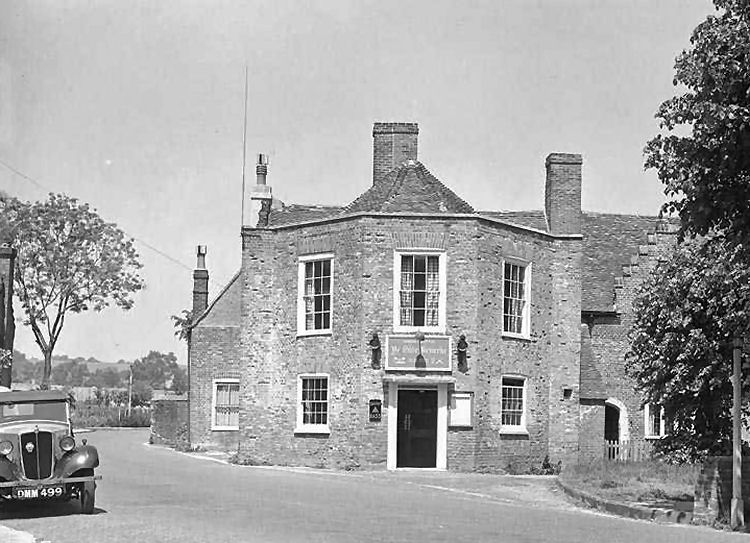
Above photo, circa 1945, kindly sent by Rory Kehoe. |
|
Dover Express 1952.
Up it goes here it comes!
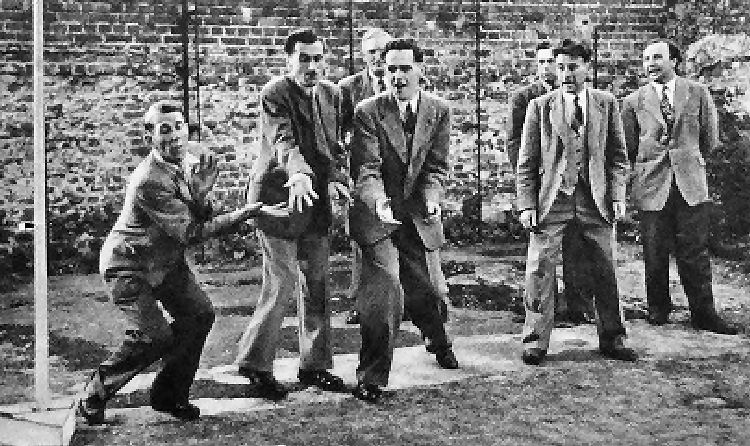
A tap on the trap and the ball leaps into the air. With a hefty
whack from the little round bat, George Hess, of the Canterbury team,
sends it whizzing down the pitch towards the two white posts. At the
other end, the opposing players, tethered by the rule that they must
keep one foot behind the line between the posts, strike tense attitudes
as they go for the ball. A catch and the batsman is out.
Photograph by Jack Testing.
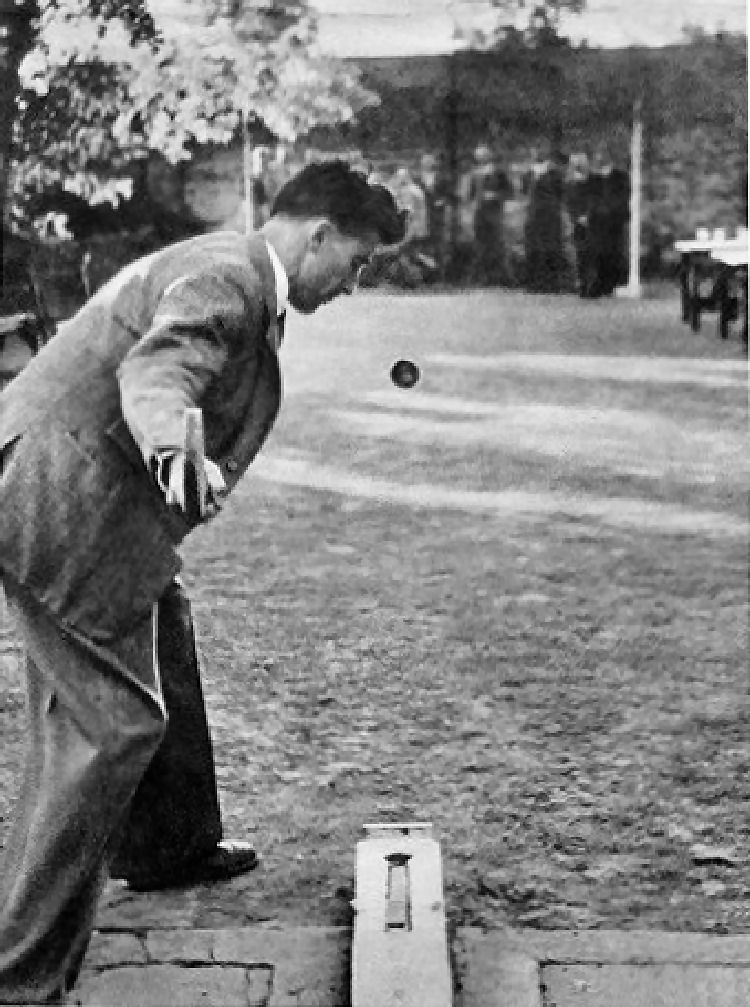
There's a catch in it!
Every summer, teams from surrounding parishes gather in the gardens of
"Ye Old Beverly," a public house in St. Stephen's, Canterbury, to play a
game which is said to have originated there hundreds of years ago. It is
called Bat and Trap, and has changed little since Pilgrim's played it in
the Middle Ages.
The game is seldom played outside Canterbury, but in that area there are
more than 30 teams. It is claimed by some that cricket originated from
Bat and Trap.
The Trap has a wooden bar mounted like a seesaw. The ball is placed on
one end and the bat then strikes the apparatus and, thus launching the
ball into the air. It's there the player endeavours to hit it between
the posts, twelve feet apart, at the other end of the pitch.
Bulls-eye board.
The goal is guarded by the opposing team, which tries to catch the ball
before it passes between the posts. While doing this, the team must have
at least one foot on the ground behind the posts. If no catch is made, a
member of the team throws the ball and a small board bearing a bulls-eye,
hinged in front of the trap. The batsman is not allowed to defend it,
and, if the board falls, he is out. If he is able to hit the ball
between the posts without being caught, and if the bulls-eye board is
not then knocked down, he scores a run.
In spite of the increasing popularity amongst younger people. Mrs. Frank
Woods landlord of the "Old Beverly," suggests that many of the older
players have given up the game. He claims that this is due to the high
price of beer. "Bat and Trap," he says, is thirsty work.
John Birch. |
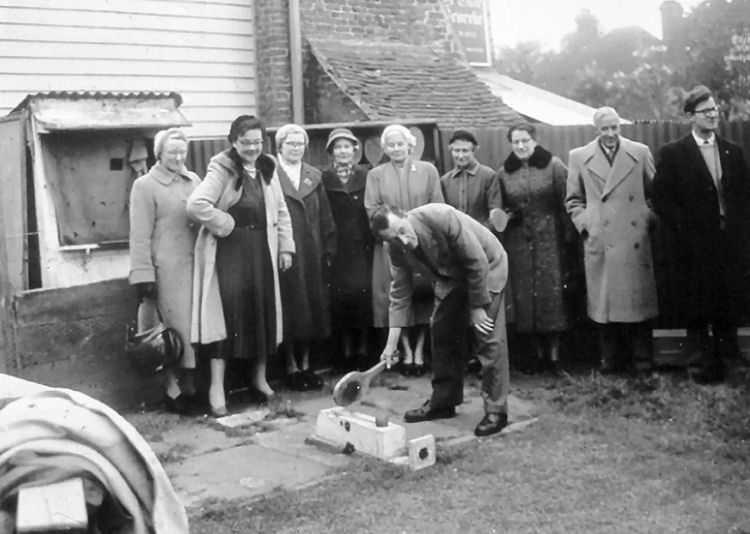
Above photo, 1954, showing a game of bat and trap, kindly sent by Rory Kehoe. |
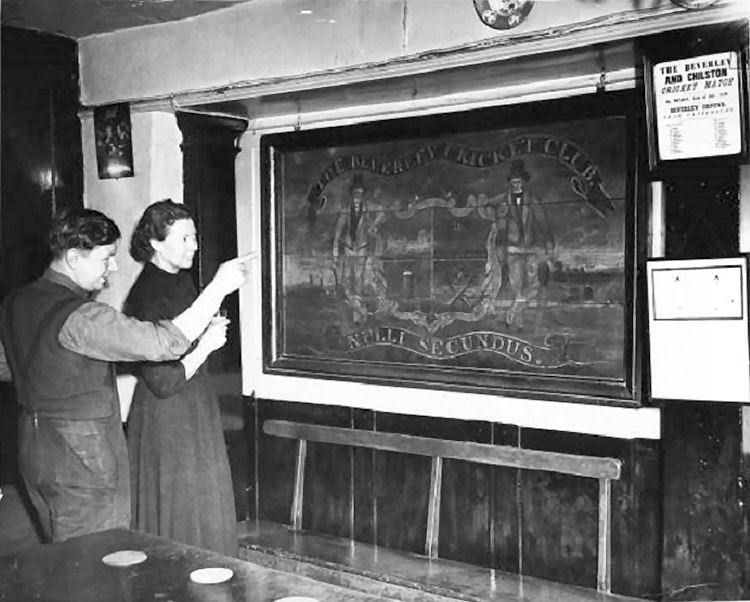
Above photo, 1955, kindly sent by Rory Kehoe. Showing the Cricket
Club panel which used to be taken down, paraded and exhibited during
Canterbury Cricket Week. |
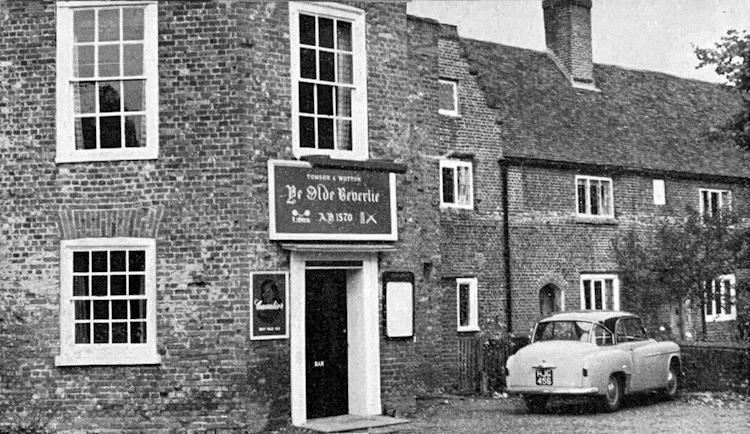
Above photo circa 1958, kindly sent by Rory Kehoe. From "Famous Old
Inns of East Kent" the pub's description runs thus. "...The house was
built in about 1570, by Sir Roger Manwood, Baron of the Exchequer, as a
house for the Parish Clerk. After long and tiring services at the local
church of St. Stephen's, the Clerk used to provide the congregation with
refreshments at his home. Eventually, the house became licensed. The Inn
is the best known of the Bat & Trap houses and it is believed that the
first game of cricket, as such, was played on St. Stephen's Green, at
the front of the Inn." Snacks (Hot & Cold) - Canterbury 63974. In this
photo, the pub is advertising Cavalier Pale Ale, which was the flagship
brand of Tomson & Wotton's Ramsgate Brewery. Established in 1634, Tomson
& Wotton was the UK's oldest brewery, until being taken over and closed
down in 1968 by Whitbread. |
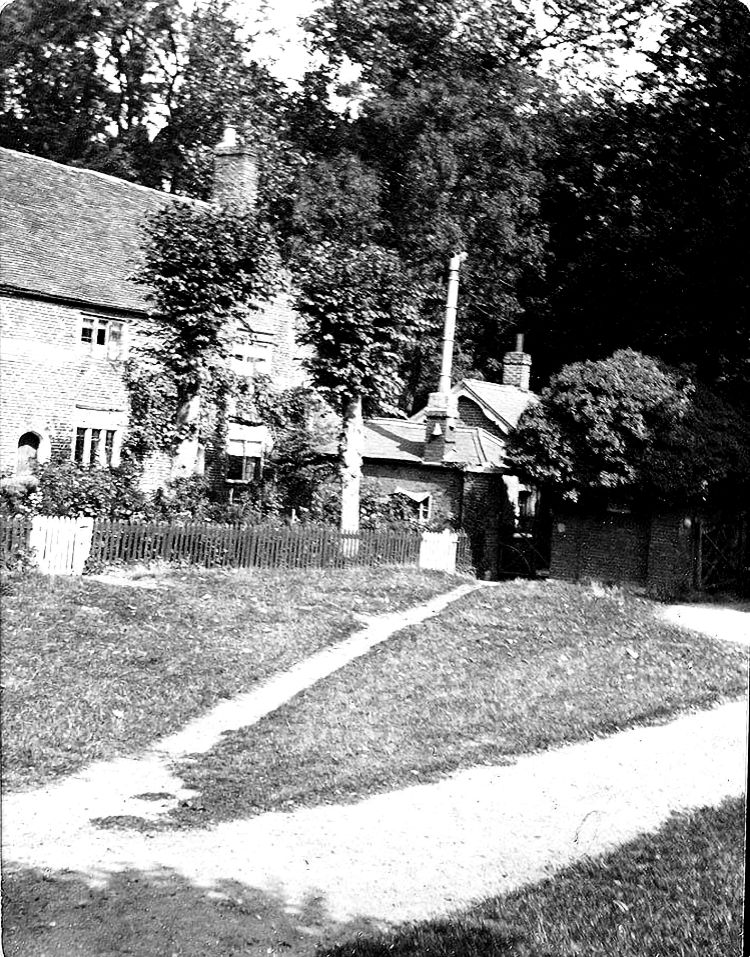
Above photo, date unknown. |
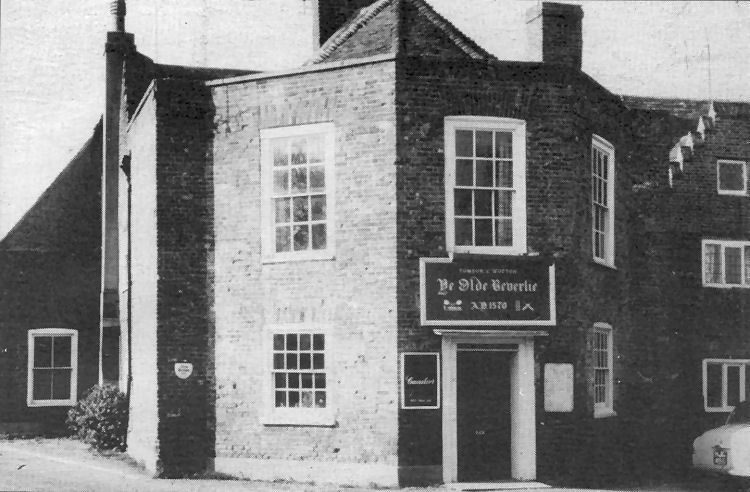
Above photograph taken by Edward Wilmot in 1965. |
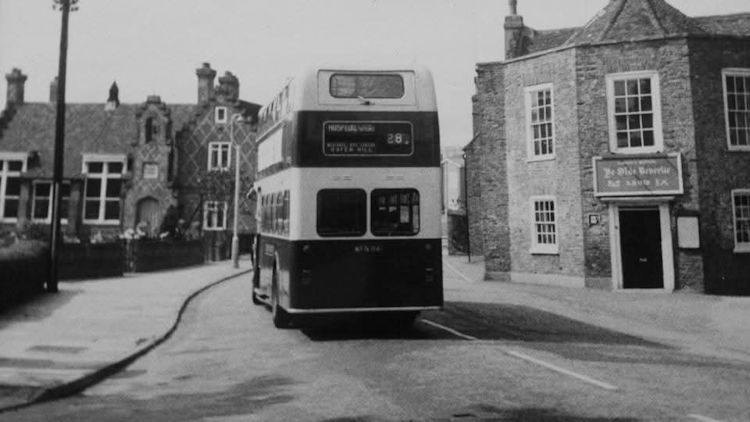
Above photo, date unknown. |
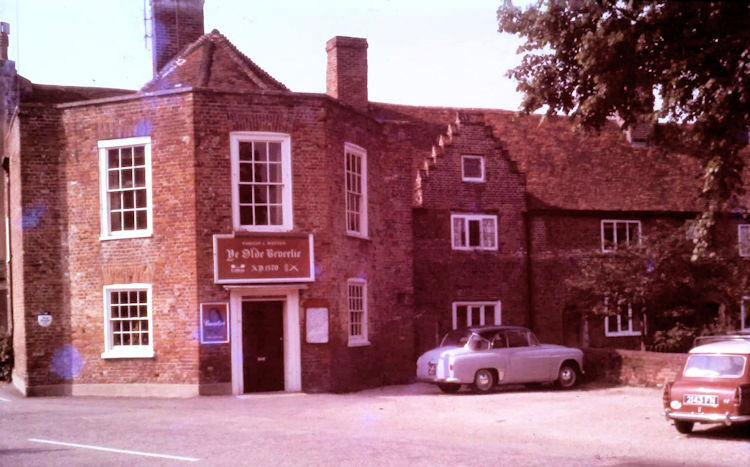
Above photo, date unknown. |
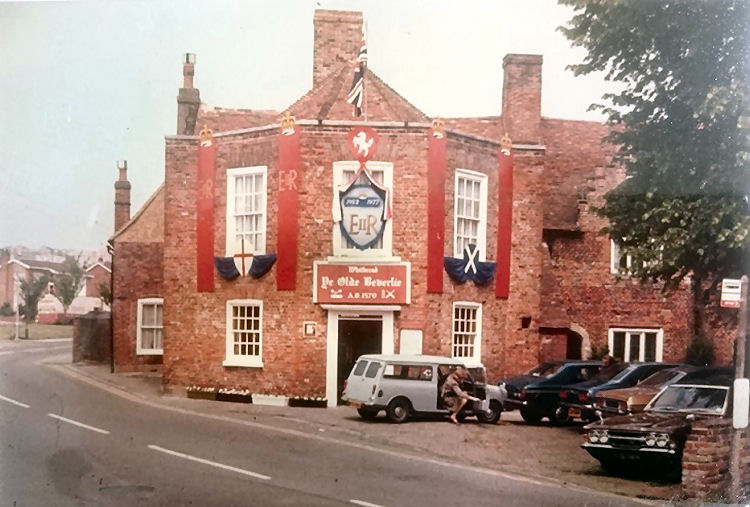
Above photo, 1977, kindly sent by Rory Kehoe. |
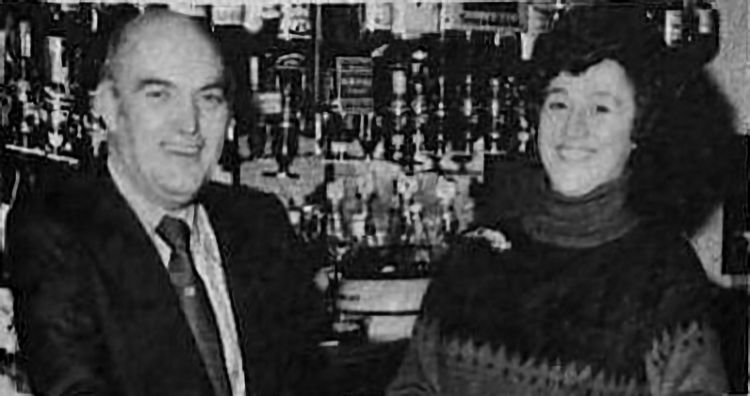
Above photo, 1978 showing licensees Frank and Jackie Gowlett. |
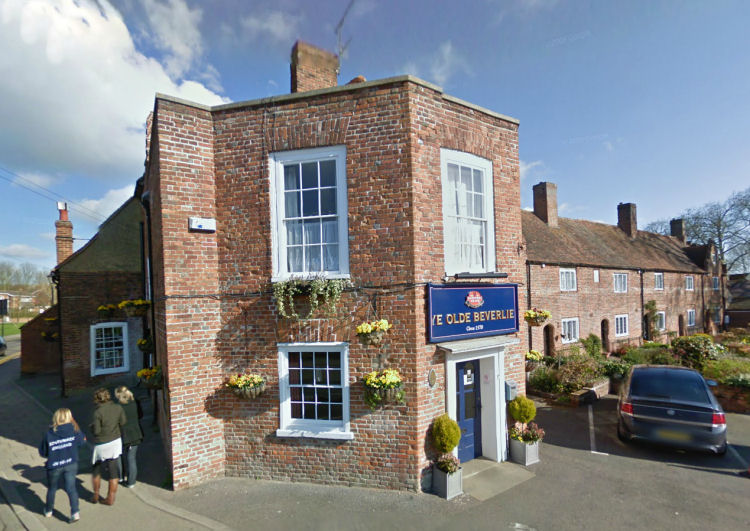
Above photo taken from Google maps March 2009. Showing the adjoining
alms houses on the right. |
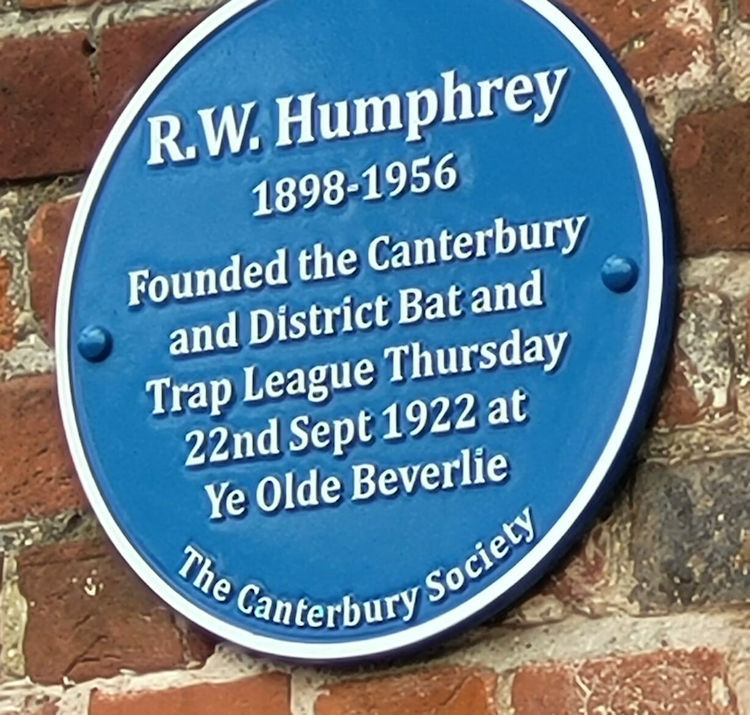
Above photo 2024. |
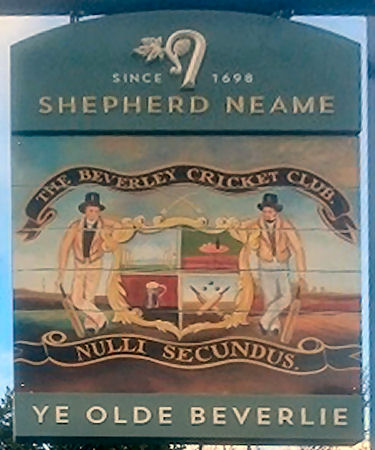
Above sign 2019 sent by Rory Kehoe. |
The building is a grade II listed red-brick building dating back to 1570,
built by Sir Roger Manwood, Lord Chief Baron of the Exchequer under
Elizabeth I, as part of a set of almshouses although on the
outside the only part visible that dates from that period is the
crow-stepped gable in the west front. The house became an inn c.1629. The front dates from the 18th century.
It was listed on 3rd December 1949.
|
From the Kentish Gazette, 19 July 1842.
GLOBE TAVERN.
WHOLESALE and RETAIL WINE and SPIRIT VAULTS 4. ST. GEORGES STREET,
CANTERBURY, UNDER THE DISTINGUISHED PATRONAGE OF THE BEVERLEY
CRICKET CLUB.
EDWARD BENNETT returns his grateful thanks to the Nobility, Gentry,
Clergy, and Inhabitants of the City of Canterbury and the County of
Kent generally, for the kind and extensive support he has received
from the Patrons of the Manly and Noble Game of Cricket.
E. B. avails himself of this opportunity to state that no exertion
shall be wanting on his part to secure their future favours.
WINES and SPIRITS of SUPERIOR QUALITY, BASS’S PALE INDIA ALE, DUBLIN
AND LONDON STOUT Draught and Bottled; GINGER BEER AND SODA WATER, AT
LONDON PRICES.
N.B. The Grand Match of Cricket between the players of Kent and
England will take place on Monday, August 1st, and Tuesday, 2nd. The
Grand Match between the Gentlemen of England and the Gentlemen of
Kent, on Thursday, August 4, and Friday, 5th. Both these interesting
Matches will be played on the Beverley Ground, adjoining the Cavalry
Barracks, Canterbury.
An Ordinary will be provided each day in an elegant Pavilion on the
Ground, by E. B. Tickets 2s. 6d. each.
A Military Band will be in attendance.
|
|
From the Kentish Chronicle, 7 April, 1860.
ST. AUGUSTINE'S PETTY SESSIONS. PUBLIC HOUSE OFFENCES.
Edward Austen, landlord of the "Beverley Arms," public-house, St.
Stephen's, was charged with allowing gaming with cards in his house,
contrary to the tenor of his license, on the 23rd March. The case was
proved by P.S. Mayhew, K.C.C., who deposed that he found four men
playing at cribbage in the defendant’s house, at half-past one o'clock
in the morning. The defendant admitted the offence, and the bench lined
him 2s. 6d., and expenses 8s.—making 10s. 6d. altogether.
|
|
From the Kentish Chronicle, 4 May, 1861.
HIGHWAY ROBBERY.
An attempt at highway robbery was made in Tuesday night, about ten
o’clock near the railway crossing in St. Stephen’s Fields, Canterbury.
As Mr. C. Austin, son of the landlord of the “Beverley Arms,” was
returning from St. Stephen’s at that hour, a rough looking fellow,
seemingly a navvy, demanded some money of him, and on being refused
grappled with him, swearing he would have something. Mr. Austin managed
to get away, and being agile escaped. The police were put on the alert,
but the rascal could not be traced. |
|
From the Kentish Chronicle, 10 May, 1862.
THE TRAP-BAT CLUB.
These favourite resorts of the Canterbury citizens on summer evening
have commenced their meetings. And in each case seem to augur well for
successful seasons. The most ancient of them, the “Beverley,” held its
first meeting at the “Beverley Arms,” St. Stephen's, on Monday evening,
the 28th of April. The St. Thomas Hill Club, held at the “City of
Canterbury Tavern,” opened the campaign on May-day. The “Castle Inn”
Club commenced its meetings in the beautiful orchard of the “Castle
Inn,” on Monday evening last, the 5th inst.; and the next evening
(Tuesday) a good muster of the members of the “Harbledown Club”
assembled on the tap-green of the “Coach and Horses Inn,” which with the
pretty gardens attached, have been got into very nice order by the new
landlord, Mr. R. Eldridge.
|
|
From the Telegraph (Brisbane) 15 August, 1914.
The Telegraph, Saturday Evening, 15 August, 1914.
KENT PARISH CLERK'S PUBLIC HOUSE
When the license of the "Old Beverley Arms" public house at St. Stephens
was transferred by the St. Augustine's (Kent) magistrates, it was stated
that the tenant held the house rent free so long as he acted as parish
clerk. It was stated that this was probably the only case of the kind in
the country. The outgoing tenant had held the license for 31 years. |
|
The Sphere, Saturday 30 May 1942.
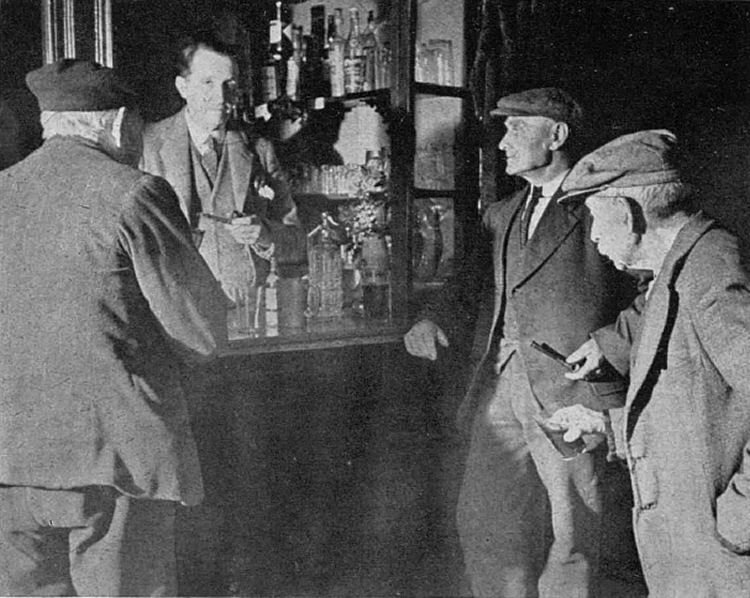
The publican of the "Beverley Inn" at Canterbury. Serving at the bar at
this old Tudor Inn is Mr. E. G. Wood, who is unique amongst the publicans
of Britain. The Inn was originally the house of the Parish Clerk
attached to the historic Cathedral. When it was converted into an Inn,
the church authorities in control of the premises made it a condition of
the tenancy that the licensee must also accept the office of Parish
Clerk and Sexton. Mr. Wood not only gets the Inn rent free, but he is
paid a penny a day for winding the church clock and 13 and 4 pence a
year for keeping Sir Roger Manwood's tomb clean, as well as fees as
Clerk and Sexton.
|
|
From the Evening Standard 18th August 1954.
"Ye Olde Beverlie" was for years administered by the Sir Roger Manwood Trust.
because of its association it had a six day licence for many years. It
probably opened in the 16th century and is now being taken over by a
brewery.
|
|
From the Kent Herald 11th August, 1954.
"The Olde Beverlie" was handed over by Senior Vesturer at Canterbury Cathedral and
licensee for the past 13 years, Mr. William E. C. Wood is, then, the
last landlord to combine the duties of host with those of Parish Clerk,
Sexton of the Church and Prior of Sir Roger Manwood Almhouses. It is now
being taken over, on lease, by Tomson and Wotton Ltd. |
The pub has also been known as the "Old Beverlie Arms" without the Ye at
the front of its title or the "e" on the end of "Old," and
the Kent Directory of 1838 simply called it the "Beverlie Arms."
The pub contains what may be the original stone floor and the building also has a
piecrust moulded ceiling, beams and fireplace, although the building itself
has been recently refurbished.
The pub claims to be the site of the invention of bat and trap, still
played there today in the large garden and courtyard. Bat and Trap reputed
to be the start of the early Kent County Cricket
Today it is referred to as a gastro pub, serving Mexican and English
cuisine from within its grill house in a separate restaurant. Also situated
is a separate function room.
The Inns of Canterbury by Edward Wilmot's, 1988, mentions a document, date
circa 1945 that gives the description of clientele at the pub as being "Residents
and visitors of all types."
No listing of this pub would be complete without making reference to
Frank & Jackie Gowlett's Boxer, Buster. Lovely dog, who was the apple of his
owners' eyes. Dogs could get away with murder in the pub when the Gowletts
ran it. Not though, students! Frank had a sign on the front door which read
something like: "...Students! This is not your university common room. Dress
properly, behave yourselves, do not move my furniture around and keep your
feet off the tables..." I think the only time students ever dared venture
into the Beverlie was when their parents were buying them Sunday lunch!
LICENSEE LIST
AUSTEN Edward 1838-82+
       (also parish clerk age 82 in 1881
(also parish clerk age 82 in 1881 ) )
BANKS William 1891-1913+
  (age 48 in 1901
(age 48 in 1901 ) ) 
WILSON Frank 1924-39+ (age 49 in 1939)
WOOD Frank E G 1942+
GOWLETT Frank & Jackie 1970-90ish
https://pubwiki.co.uk/BeverleyArms.shtml
 Stapleton's
Guide 1838 Stapleton's
Guide 1838
 From the Pigot's Directory 1840 From the Pigot's Directory 1840
 From the Post Office Directory 1855 From the Post Office Directory 1855
 From Melville's Directory 1858 From Melville's Directory 1858
 From the Post Office Directory 1862 From the Post Office Directory 1862
 From the Post Office Directory 1874 From the Post Office Directory 1874
 Census Census
 From the Post Office Directory 1882 From the Post Office Directory 1882
 From the Post Office Directory 1891 From the Post Office Directory 1891
 From the Kelly's Directory 1903 From the Kelly's Directory 1903
 From the Post Office Directory 1913 From the Post Office Directory 1913
 Census Census
|




























